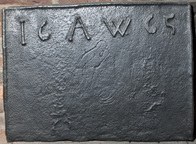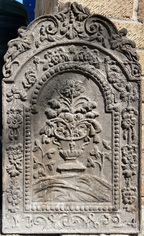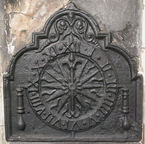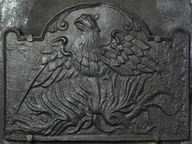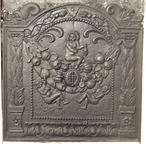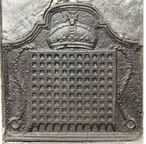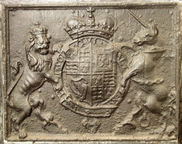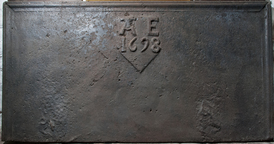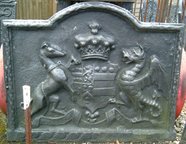-
1322
Description: Quasi-rectangular shape; twisted rope edging (top and sides); top, initials 'A W' between split date '1665', the '1' of a different character set to the other numbers.
Notes: The distinctive form of the '5' identifies this fireback in a series with other firebacks; the '1' is also peculiar to the series. The curious intaglio shape in the middle of the plate may have resulted from a length of string or thin cord left on the surface of the mould when the iron was poured.
Inscription: 1 6 A W 6 5
- Decoration tags:
- rectangular (shape)
- rope (edging)
- simple stamps
- carved stamps
- individual letters
- individual numbers
- text
Manufactured: in 1665 in the Weald area of England.
Current location: in private hands, Pulborough, West Sussex, England.
- Attached to series:
- Shortened '5' series
-
1191
Description: Rectangular; twisted rope edging (top and sides only); eight shields of Ayloffe impaling Sulyard in three rows, 3-2-3; Ayloffe: sable, a lion rampant Or, collared gules, between three crosses formy of the second; Sulyard: argent, a chevron gules between three pheons inverted sable.
Notes: William Ayloffe (c1535-1584) of Bretons, Hornchurch, Essex, Justice of the Court of Queen’s Bench, married (c1560) Jane, dau. of Sir Eustace Sulyard, of Runwell, Essex. Illustrated in Lloyd (1925).
Arms: Ayloffe impaling Sulyard (William Ayloffe of Bretons, Hornchurch)
- Decoration tags:
- rectangular (shape)
- rope (edging)
- carved stamps
- heraldic
- armorial
Manufactured: in the early-17th century in the Weald area of England.
Current location: Great Dixter, Northiam, East Sussex, England.
Citation: Lloyd, N., 1925, 'Domestic Ironwork I', Architectural Review, 58, pp. 58-67.
- Attached to series:
- Ayloffe series
- Personal armorial firebacks
-
549
Description: Arched rectangular shaped central panel, bead on fillet edging, narrow-necked urn with flowers issuing therefrom; arched rectangular shaped border with fillet edging and symmetrical floral festoons; on top, stylised fish with floral accessories; at bottom, two looped 'W' figures between date split between bottom corners.
Notes: The smallest of six flower vase designs in this series. All incorporate the looped 'W' motif which may be intended to identify the pattern maker. The small size of this fireback makes it likely that it was intended to be fixed to the back of a grate. Reeman Dansie auction, Colchester, 30 Sep 2025, lot 5292 (£46).
Copies of this fireback are known.
Inscription: 17 24
Manufactured: in 1724 in England.
Current location: not known.
- Attached to series:
- 1724 series
- British 'Dutch' style firebacks
-
589
Description: Double arched rectangular shaped; ovolo edging; central clock dial with Roman numerals separated by stops, sunburst inside, single hand with fleur de lys pointer; teardrop weights suspended from each side; symmetrical tendrils above.
Notes: One of the ‘hooked 1’ series of firebacks - the number ‘1’ is just discernable bottom left; two versions exist of this fireback, the other having finials above the suspended weights.
Copies of this fireback are known.
Inscription: I · II · III · IIII · V · VI · VII · VIII · IX · X · XI · XII / 16...
- Decoration tags:
- rectangular with round arch (shape)
- ovolo (edging)
- whole carved pattern
- text
- objects
Manufactured: in the mid-17th century possibly at Brede Furnace in the Weald area of England.
Current location: Ham House, Richmond, Surrey, England.
Museum number: 1139737 (part of the National Trust museum group)
- Attached to series:
- Hooked '1' series
- Brede group
-
590
Description: Quasi-arched rectangular shape, semi-circular protrusions on top corners; cavetto-moulded edging; two mirrored scrolls inside arch; a phoenix in flames, its wings displayed and inverted.
Notes: A defaced variant of no. 895, which bears the date, 1650, and the initials, IM; a loop normally at the top is absent, and careless pouring of the iron has obliterated some of the detail down the right side of the casting.
Copies of this fireback are known.
- Decoration tags:
- rectangular with round arch (shape)
- cavetto (edging)
- whole carved pattern
- planklines
- pictorial
- mythological
- animals
Manufactured: in the mid-17th century possibly at Brede Furnace in the Weald area of England.
Current location: Ham House, Richmond, Surrey, England.
Museum number: 1139821 (part of the National Trust museum group)
- Attached to series:
- IM series
- Hooked '1' series
- Brede group
- Phoenix firebacks
-
591
Description: Arched rectangular shaped; cavetto-moulded edging; on each side a column of large overlapping leaves above a pedestal with a single rose; issuing from the top of each column two ribbons, in figure-of-eight with grenade terminals, fly across the arch; within an arched central panel with bead edging three naked children disport about a swag of fruit, with a central pomegranate, suspended from the top of each column; one figure sits on the top, facing right, the other two hang symmetrically from below; along the base is a line of acanthus leaves; on top a sea serpent is curled on each end.
Notes: The design may have been inspired by the paintings of Jan Pauwel Gillemans the younger (1651-1704); he may have worked in London in 1675-8. Another version (no. 575), probably by the same pattern maker, has a central finial on top and different proportioned fruit and figures. Copies of this fireback were advertised in Bratt Colbran Ltd.'s (London) catalogue in the early-20th century.
Copies of this fireback are known.
- Decoration tags:
- 'Dutch' (shape)
- cavetto (edging)
- whole carved pattern
- pictorial
- mythological
- humans
- plants
Manufactured: in the mid- to late-17th century in England.
Current location: Ham House, Richmond, Surrey, England.
Museum number: 1140116 (part of the National Trust museum group)
- Attached to series:
- Carolean 'Dutch' series
-
592
Description: Flattened arched rectangular shape with rebated concave shoulders; double fillet edging; 11 x 9 grid portcullis with symmetrical chains in ‘S’ arrangement ending in a ring, from top corners, surmounted by an arched royal crown.
Notes: Whole pattern; the portcullis has a realistic, rather than symbolic, appearance.
Copies of this fireback are known.
- Decoration tags:
- rectangular with canted top corners and round arch (shape)
- stepped fillet (edging)
- whole carved pattern
- heraldic
- pictorial
- objects
Manufactured: in the late-16th to early-17th century in England.
Current location: Ham House, Richmond, Surrey, England.
Museum number: 1140112 (part of the National Trust museum group)
- Attached to series:
- Miscellaneous royal firebacks
-
593
Description: Rectangular, cavetto moulded edging; Stuart royal shield, garter, supporters and crown.
Notes: Four clear vertical plank lines indicate that the pattern for this fireback was formed of a series of boards probably secured by horizontal battens on the rear.
Copies of this fireback are known.
Inscription: HONI SOIT QVI MAL Y PENSE
Arms: English Stuart royal
- Decoration tags:
- rectangular (shape)
- cavetto (edging)
- whole carved pattern
- planklines
- armorial
- royal
- text
Manufactured: in the late-17th century in England.
Current location: Ham House, Richmond, Surrey, England.
Museum number: 1140118 (part of the National Trust museum group)
- Attached to series:
- Stuart royal armorial firebacks
-
1096
Description: Rectangular shape; ogee/cyma reversa moulded edging (top and sides); top centre, shield-shaped stamp bearing initials above date.
Notes: Two blemishes on the surface of the casting indicate that the molten iron was probably poured from two ladles simultaneously disturbing the casting sand in both locations.
Inscription: AE / 1698
- Decoration tags:
- rectangular (shape)
- cyma reversa/ogee (edging)
- carved stamps
- date stamp
- heraldic
- text
Manufactured: in 1698 in the Weald area of England.
Current location: The Manor House, Mark Cross Lane, Ripe, East Sussex, England.
- Attached to series:
- Date & initials firebacks
-
596
Description: Arched rectangular shape with base plinth; astragal and fillet edging (top and sides) with overlapping leaf pattern; mirrored wave pattern on plinth; shield, supporters, motto scroll and coronet of the 1st Earl of Ashburnham.
Notes: The arms are Ashburnham impaling Grey: Ashburnham: quarterly 1. Ashburnham - gules a fess between six mullets argent; 2. Holland - azure semee of fleurs-de-lys a lion rampant guardant argent; 3. Kenn - ermine three crescents gules; 4. Vaughan - sable a fess argent between three boys' heads couped at the shoulders proper having snakes enwrapped about their necks vert; and Grey - barry of six argent and azure in chief three torteaux. John, 3rd Baron Ashburnham, married Lady Jemima Grey in 1724. He was created Earl of Ashburnham in 1730 so the fireback probably dates between then and 1731 when Lady Ashburnham died. A sketch of an example of this fireback was made by J. Starkie Gardner c.1891 and is in his collection at the Victoria and Albert Museum, Archive of Art and Design (AAD/2014/8).
Copies of this fireback are known.
Inscription: LE ROY ET L'ESTAT [barely legible]
Arms: John, 1st Earl of Ashburnham
- Decoration tags:
- rectangular with round arch (shape)
- astragal & fillet (edging)
- whole carved pattern
- armorial
Manufactured: in the early-18th century probably at Ashburnham Furnace in the Weald area of England.
Current location: Mark Ripley Forge & Fireplaces, Northbridge Street, Robertsbridge, East Sussex, England.
Citation: Denny, H., 1937, 'Iron Fire-back', Sussex Notes and Queries, 6, 6, p. 189.
- Attached to series:
- Ashburnham family firebacks
- Personal armorial firebacks
